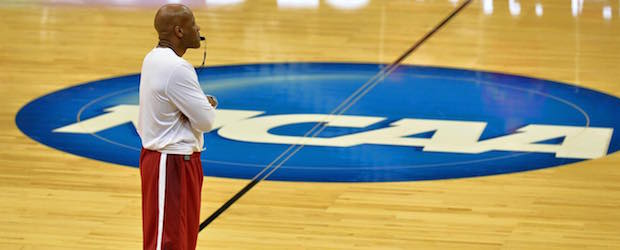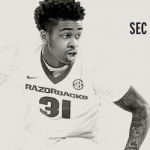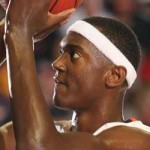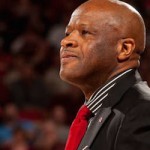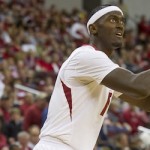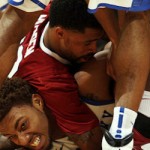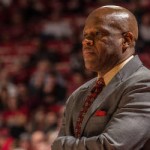 The constant with every team that advances in the NCAA tournament is its defense and guard play. Arkansas has had issues with both this season, and if the Hogs exit Thursday night in what would be a big upset, or Saturday likely against North Carolina, which would not be a shocker, the results will be influenced mostly those two key areas.
The constant with every team that advances in the NCAA tournament is its defense and guard play. Arkansas has had issues with both this season, and if the Hogs exit Thursday night in what would be a big upset, or Saturday likely against North Carolina, which would not be a shocker, the results will be influenced mostly those two key areas.
Teams with better, quicker, good shooting guards gave Arkansas fits in December and January. Ole Miss with Stephan Moody and crew came into Bud Walton Arena and wore out the Hogs 96-82. That result was fully forecast a few weeks earlier when middle-of-the-pack Southland Conference foe Northwestern State and its talented backcourt proved troublesome to the final horn vs. the Hogs before the good guys prevailed.
A lot of Ole Miss supporters made a big deal about UA coach Mike Anderson barely acknowledging Rebels coach Andy Kennedy after that 14-point clubbing on the Hogs’ home court in mid-January, but Anderson looked more shell-shocked than anything else. Arkansas gave little real “Razorback-type” defensive effort the entire game, allowing Ole Miss to shoot better than 60 percent — either draining wide-open long bombs or uncontested, easy layups, over and over. Arkansas fell behind quickly 29-13 and barely put a dent in that deficit.
Once Anderson had gotten over his own shock, he and his staff refocused their players on the defensive end for the first time all season. It appeared up to that point that the plan this year had been to gear-up the offense to just outscore people.
The best defense Arkansas played all season then came at home against Mississippi State and South Carolina, a pair of 20-point wins; a revenge, one-point win at Ole Miss in the return match; and a first-half blowout of Texas A&M where the full-court pressure was maybe never better under Mike Anderson. Whatever happened in the intermission locker room vs. A&M, Arkansas got away from its grinding defense against the Aggies, barely holding on to a 25-point lead; a big loss at Kentucky a few days later brought the Hogs back down to earth. Even worse, Arkansas managed to be outscored by 31-points in about a 17-minute stretch of the game against South Carolina in the next time out — that takes some really awful play to manage that; even Kentucky needed almost 32 minutes to build a 31-point edge over Arkansas in Rupp Arena — before the Hogs regained their poise and defense and finished the game on a winning 15-3 run. Arkansas seemed dead-legged early against LSU, battled uphill the whole game and lost on a buzzer beater to conclude the regular season.
Anderson had restored the team’s defensive focus for the SEC tourney in Nashville, and and Hogs made it to the title game against a much-more-talented Kentucky.
So, during the most important stretch of the season, Arkansas lost just three times in 13 games, twice to No. 1 and seemingly unbeatable Kentucky.
Arkansas has done this with freshman Anton Beard being pretty much the only consistent guard among the Hogs’ backcourt players. Beard has taken a huge load off of Rashad “Ky” Madden, turning the 6-6 senior into a top facilitator of the offense when he’s sharp — Madden was far from his best against Georgia and Kentucky last week, and needs to return to where he was late in the regular season when he could be counted on for few if any turnovers and a handful of assists and baskets. Behind them, junior shooting guard Anthlon Bell brings either a fiery hot outside shot or nothing, but down the stretch he’s been more on than off and his defense has improved. When sophomore Manny Watkins plays more than this early sub role in the first half with the backup five, it’s for defense, though he won’t be forgotten for his game winning basket at Ole Miss. Jabril Durham appears stuck in that twilight zone that seems to beset most junior college transfers, and freshman Nick Babb was barely even used (likely for defensive liabilities) until suddenly being inserted against Georgia to provide some offense than no one else could muster. Babb came through and Arkansas rolled to a surprisingly easy win over a beat-up but NCAA tournament-bound Bulldog squad.
Arkansas’s guard play will be alleviated a great deal next season when Jimmy Whitt arrives to join Beard in the backcourt, though it still seems like the Hogs could use another top 6-2 talent with outside shooting ability and speed to run the court, if roster space on the team existed (right now nobody can deduce what sophomore forward Bobby Portis and junior swingman Michael Qualls will do after this season ends).
The Hogs have had to make due against better backcourts all year, and Wofford on Thursday may pose the same problem. Surely North Carolina with Marcus Page and J.P. Tokoto will be among the best guard combos the Hogs have seen this year.
In Wofford, the Terriers have a three-guard attack led by Karl Cochran, who at 6-3 appears to do a little of everything — a team-leading 15 points per game, 5.8 rebounds (second on team), almost 3 assists a game. He’s taken 256 three-point shots, almost triple the number of anyone else on the Terriers. He shoots better than 37 percent on 3-pointers, as do his running mates, sophomores Eric Garcia (6-0) and Jaylen Allen (6-3), in the backcourt. (To put that in perspective, Kentucky sharpshooter Andrew Harrison hits 36 percent.)
On paper, Arkansas should benefit from having to players 6-5 or taller (Madden and Qualls) handling two of the Wofford guards when the Razorback play man-to-man, and Portis at 6-10 and Alandise Harris at 6-6, plus 6-7 Jacorey Williams and 6-9 Moses Kingsley, wouldn’t seem to be overmatched by a Wofford’s front line. However, it never fails that a mid-major like this typically has inside players who will out-quick taller Arkansas teams in this setting. Quickness and speed are not pluses for this Razorback team, despite Anderson’s penchant for full-court pressing nearly 40 minutes.
In fact, this is hardly an “ideal” Anderson team compared with some of his better squads he assembled deep into his stops at UAB and Missouri. Those teams seemed better recruited to his desire to press and speed up the game. At Arkansas, Anderson appears to have had to settle early on in his recruiting (remember, Qualls was considered by many as a project out of Shreveport and not highly recruited, and overall guard recruiting by this staff has been lacking until Whitt signed on) or to accept what was left him from the John Pelphrey era, and Pelphrey never seemed to have a handle on how he wanted to build his team.
The type of team Anderson truly envisions may still be a year or more away. If Portis stays an additional season to improve his draft stock, we could see something closer to that style of team next year.
But Arkansas isn’t playing “next year” against Wofford on Thursday in the NCAA tournament, or the North Carolina/Harvard winner on Saturday. They’ll have to do what they’ve done 26 times this year and make the most of this team’s makeup. The strongest asset has been the chemistry, especially in tight games, and that, along with defense and some solid guard work, could be enough this weekend.


